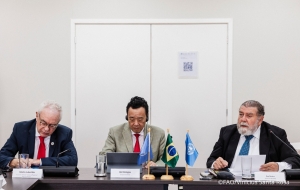Brazil and FAO hold 4th Meeting of the Advisory Committee of the South-South Cooperation Partnership
The directors from FAO and the Brazilian Cooperation Agency inaugurated the meeting, which was attended by representatives of cooperating Brazilian institutions.

Brasília, September 13, 2023 – On the same day that the United Nations Day for South-South Cooperation was celebrated, September 12, the 4th Meeting of the Advisory Committee of the Brazil-FAO International Cooperation Program was held in Brasília, Brazil. The meeting was opened by the Director General of the Food and Agriculture Organization of the United Nations (FAO), QU Dongyu, and by the Director of the Brazilian Cooperation Agency of the Ministry of Foreign Affairs (ABC/MRE), ambassador Ruy Pereira.
For 15 years, and with around 60 million dollars already invested, Brazil and FAO have worked towards sustainable, human, and institutional development, for partners from several countries in Latin America and the Caribbean.
In his words, the Director General of FAO commented on the future of the partnership between FAO and the government of Brazil and the importance of including new partners, themes and geographic regions. Regarding the date on which South-South cooperation (CSS) is celebrated, QU Dongyu stated that this type of alliance is based on three fundamental elements: solidarity, equity, and partnerships. He also highlighted the importance of SSC in achieving the United Nations Sustainable Development Goals (SDGs). Dongyu also highlighted Brazil's role in leading an international agenda to combat hunger and poverty. "Let's look forward. To the future. Define how we can cooperate in a complementary way," he said.
The Director of ABC/MRE pointed out the fundamental role of the Agency's Brazilian partner institutions in implementing international cooperation projects for development coordinated by ABC. "It is the Brazilian institutions that, in practice, make the partnership program happen. They are the ones who go into the field”, highlighted the ambassador who also stated that “Brazil leads international cooperation actions with a view to economic and social development”. Pereira said that the objective of the partnership is to continue contributing “increasingly to the expansion and dissemination of knowledge between partners, in processes of mutual learning”.
Future agendas with cooperating institutions
During the meeting, Brazilian institutions partnering in the implementation of cooperation projects with FAO discussed possible topics on the Brazilian government's current agenda that could form a new phase of the Brazil-FAO International Cooperation Program. Among the major themes that could be included in the new cycle of the partnership between Brazil and FAO are support for family farming; food supply and marketing; intelligence and territorial management; access to healthy foods and school meals; and agri-environmental policies and sustainable development.
In the coming months, ABC and FAO are expected to meet to outline a new logical framework for the partnership program. This framework will encompass the methodological approach used mainly in development and management projects to ensure effective planning, monitoring and evaluation project progress and impact. Within the scope of the Brazil-FAO International Cooperation Program, the new logical framework may include new themes and priority partner countries and new dynamics for the continuity of the partnership.
Were present the Representatives from the National Agency for Technical Assistance and Rural Extension (ANATER), the Brazilian Association of State Entities for Technical Assistance and Rural Extension (ASBRAER), the National Supply Company (CONAB), the Brazilian Agricultural Research Corporation (Embrapa), the National Fund were present. of Education Development (FNDE), National Institute of Colonization and Agrarian Reform (INCRA), Ministry of Agriculture, Livestock and Supply (MAPA), Ministry of Agrarian Development (MDA), Ministry of Social Development (MDS), Ministry of the Environment (MMA) and Brazilian Micro and Small Business Support Service (Sebrae).
Brazil-FAO International Cooperation Program
Brazil has a long history of public policies to end hunger, reduce poverty, promote research and innovation in agriculture and strengthen institutions for rural and urban development. In 2008, due to the growing interest of other developing countries in learning about successful Brazilian policies in food and nutritional security (SAN) and agriculture, the Brazilian government began a partnership with FAO to share Brazil's experience through South-South cooperation, based on the organization's comparative advantages. In this context, the Brazil-FAO International Cooperation Program was designed, which has been one of the richest in terms of exchanging experiences, improving public policies, and providing technical and financial support to promote sustainable development in the Latin American and Caribbean region.
